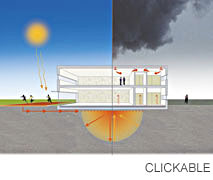Renewable Energy Directive 2009
The Renewable Energy Directive ("RED") was published in 2009 by the European Union as Directive 2009/28/EU. It seeks to promote the use of energy from renewable sources among Member States.
The UK has responded to the RED by introducing legislation to promote renewable electricity generation under FITS and to promote Renewable Heat generation with the Renewable Heat Incentive ("RHI").
Heat from the ground is classed as Renewable by the Renewable Energy Directive. The RED includes the following definitions:
- 'energy from renewable sources' means energy from renewable non-fossil sources, namely wind, solar, aerothermal, geothermal, hydrothermal and ocean energy, hydropower, biomass, landfill gas, sewage treatment plant gas and biogases,
- 'geothermal energy' means energy stored in the form of heat beneath the surface of solid earth.
The RED refers consistently to heating and cooling throughout the document: it is clear that the authors see heating and cooling as part of the same continuum and always mention cooling whenever heating is mentioned.
For example in Article 5:
1. The gross final consumption of energy from renewable sources in each Member State shall be calculated as the sum of:
- (a) gross final consumption of electricity from renewable energy sources
- (b) gross final consumption of energy from renewable sources for heating and cooling
- (c) final energy consumption of energy from renewable sources in transport
The RED recognises that heat pumps are used to extract renewable energy from the ground, and that some of the energy used in this process may not be renewable energy (if it is electricity from a fossil-fuelled source). It therefore includes Annex VII on "Accounting of energy from heat pumps".
Article 5 also says: Aerothermal, geothermal and hydrothermal heat energy captured by heat pumps shall be taken into account for the purposes of paragraph 1(b) provided that the final energy output significantly exceeds the primary energy input required to drive the heat pumps. This paragraph has been translated into a requirement that the SPF of the heat pump should be at least 2.5 for the energy used to be counted as "renewable".
Ground Source Energy provides Renewable Heat
By these words the RED recognises energy stored beneath the surface of solid earth as renewable energy, and recognises that a heat pump is the mechanism by which heat is extracted (with the proviso that the heat pump should exceeds an SPF of 2.5).
The Renewable Energy Directive recognises that heat extracted from the ground to heat a building will be replaced or renewed following the fundamental observation in physics that heat has a tendency to move from hotter bodies to colder bodies, unless inhibited by insulation. In this way renewable heat can be provided – without the need to burn fossil fuels and release CO2 into the atmosphere.
DECC in the UK recognises renewable heat and promotes it with the Renewable Heat Incentive.
Ground Source Energy provides Renewable Cooling
The same principles are a play when cooling is provided to a building from the ground. A heat pump, or just a circulation pump, can be used to transfer heat from the building down to the ground. The heat deposited into the ground will follow the same tendency to move from this hotter ground to surrounding cooler ground and so that the ground can be used again and again to provide further renewable cooling – without the need to burn fossil fuels and release CO2 into the atmosphere. As in the case of renewable heat it would be logical to have the same proviso that the SPF of the heat pump should exceed a minimum figure of at least 2.5.
DECC in the UK does not yet recognise renewable cooling and does not yet promote it with the Renewable Heat Incentive. However, there is a massive opportunity to save tonnes of CO2 by substituting Renewable Cooling for the large number of air conditioning systems that fight to waste heat out of roof top chillers in the summer months in England.
See also: IHT Systems Design
See also: Renewable Heat Incentive
See also: Renewable Cooling
See also: District Heating using IHT
See also: Banking on IHT | The Merton Rule | Clean Energy Cashback



